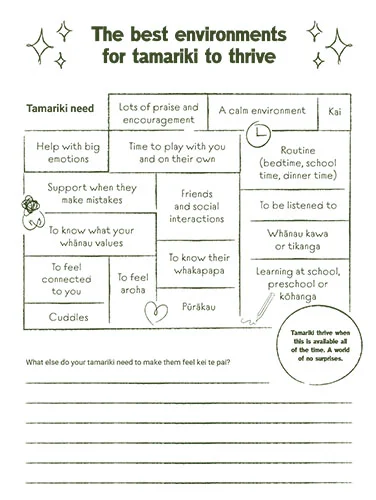
Supporting families affected by trauma
A starting point for understanding how best to support families and children affected by trauma.
The more healthy relationships a child has, the more likely he will be to recover from trauma and thrive. Relationships are the agents of change and the most powerful therapy is human love.
Bruce D. Perry
Bruce Perry’s work with children affected by trauma through the Child Trauma Academy has been well known for many years.
- In this video Bruce Perry explains the effects of adversity in early life(external link) on future physical and mental health.
- This chapter by Bruce Perry and Christine Ludy-Dobson, called ‘The role of healthy relational interactions in buffering the impact of childhood trauma’(external link), tells us that all children need positive support relationships to build resilience.
What happens when that optimal situation is disrupted? What sort of things might a whānau supporter notice in a 3-year-old who has encountered trauma, neglect or adversity?
The child may be openly distressed and acting out with troubling behaviour such as:
- rage
- aggression
- tantrums
- self-harm
- lying and stealing
- sexual awareness not matching their age.
Or they may be more inclined to internalising behaviours such as:
- sleeping difficulties
- toileting mishaps
- health problems
- withdrawing
- being unable to focus or pay attention.
Very likely the parents or caregivers will talk about the challenges they experience with their child.
All children have similar needs from their parents or caregivers, whether they have had traumatic beginnings or not. The earlier and easier these needs are met, the fewer problems are encountered as the child develops.
The literature tells us that children affected by trauma need positive supportive relationships to build resilience. Children need adults who are able to build a respectful relationship with them; someone who can implement ngā tohu whānau (the 6 principles), which are summarised in the Tākai poster ‘Six things children need to grow up to be happy capable adults’.
Ara mātua (parenting pathways) are also based on the 6 principles, and provide whānau with specific tasks and goals to help them establish healthy patterns of behaviour and to build solid relationships.
The parent child connection is the most powerful mental health intervention known to mankind.
Bessel van der Kolk
Learn more
Good relationships are the key to healing trauma, Karen Treisman
TEDxTalks (YouTube)
Psychologist Dr Karen Treisman highlights the significance of parent-child ‘serve and return’ interactions, and the importance of the guiding principles of trust, safety and investing in reciprocal relationships.
Childhood Trauma: impact on development and behaviour
The Goodfellow Unit
The links to free, online courses from the Goodfellow Unit each take approximately 1.5 hours to complete. They stress the importance of the need for children to have a stable and committed relationship with a supportive parent, caregiver or other adult.












